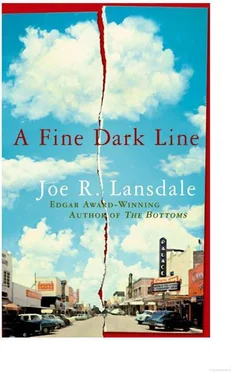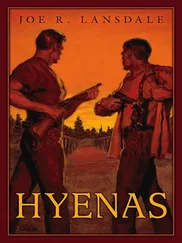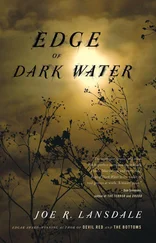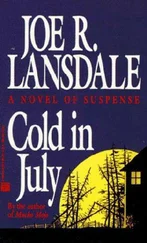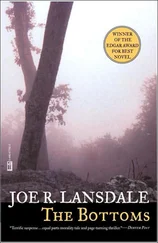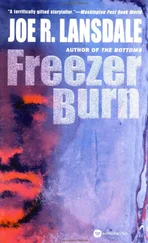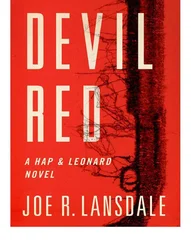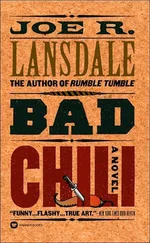We had reached the far side of the building, near the mouth of the sawdust chute. Chapman’s shadow filled the doorway, then he was moving forward.
“You have just given yourselves to God’s mercy.”
“God can kiss my ass,” Richard said.
Chapman roared, came across the floor. The entire building shook and the floor screamed and rose up and buckled and there was a crack, and Chapman’s right leg went through. It went through so fast his left leg, which stayed on the flooring, bent under him and went backwards and twisted in a way that it hurt to see. A piece of bone had torn through his flesh, ripped through his overalls, and it stuck out like a muddy stick. I could see too where the floor had broken up and made a barbed piece of wood and it had gone into Chapman’s lower abdomen. He had dropped the scythe.
Chapman screamed so loud I thought the building would collapse from the noise. “You beast,” Chapman said. “You devil. God curse you for the bastard of Satan you are. O, merciful God, deliver me from this pain and this boy.”
I glanced at Richard. A spear of moonlight lay across his eyes and nose. I could see tears in his eyes. He eased forward. The floor creaked.
“Careful, Richard,” I said. “Be careful.”
Richard picked up the scythe. He said, “Stand to the side and give me room, Stanley.”
“No,” I said. “Don’t do it.”
“Move aside.”
“Don’t do it, Richard.”
“Then you better watch the blade as she comes, Stanley. Daddy, God is gonna grant you one last wish. You ain’t gonna have pain no more, and you ain’t gonna have to worry on me none.”
I leaped back against the wall and there was a whisper and a glint of silver and the sound of Nub barking insanely.
The blade appeared to have passed in front of Chapman, and for an instant, I thought Richard had missed. Then Chapman’s head rolled to the side and fell through the hole his fall had made. There was a burst of darkness from his neck and it splashed warm across me and Nub and Richard. Chapman’s body bent forward, the boards creaked, cracked, and he fell on through, leaving a great gap in the center of the room.
Richard dropped the scythe and it went through the hole. He turned, looked at me, sat down on the floor next to the wall. Sat down so hard I thought the whole rotten building would fall. It shook and sagged and squeaked and creaked, finally went still and silent.
Nub stopped barking. He lay passive in my arms, his ears raised. Outside, gradually, I began to hear what had been going on all along.
Crickets.
An owl in the distance.
Somewhere, the howling of dogs.
24
THERE’S NO WAY I can tell you the type of commotion all of this created. You have some idea, of course. But in 1958 a crime like this was a sensation. Or should have been. It got little play outside of Dewmont, however. It didn’t get picked up all over like you would expect. That was due to the town fathers, and Mr. Stilwind, who owned the newspaper.
Me and Richard missed a week of school. The police quizzed us for a few days and we were under a kind of mild house arrest without the arrest, if that makes sense. But it was made clear we weren’t supposed to go anywhere until they said so.
The police tried to play the idea that we had gone in together to murder Richard’s old man because of some sort of grudge Richard held for being thrown out.
But we kept to our story, which was the truth. About how we dug up the dog because Richard wanted to put it on the back porch to make his old man aware of how he felt.
It was such a dumb story they couldn’t help but believe it. Besides, it was true.
Then there were the reporters. Each one trying to make the first big scoop of their lives. Pieces of it ended up in the paper outside of Dewmont, but it was downplayed and it didn’t hit the big news much. A piece in the back of the Houston paper, a stamp-size square in the Dallas paper, and a few sentences in the Tyler rag. I think some money might have changed hands.
I told the police about the graveyard, of course, and Richard told them about the bodies and how they were people who had worked for his father. I told them about Margret. I told them that he may have killed Jewel Ellen. Mr. Stilwind later got wind of that and made a public display of the story about Jewel Ellen being murdered by Mr. Chapman.
That part did make the papers, and most of what you heard later was how this man had been killed trying to kill two children, and how he was responsible for the death of the daughter of the town’s premier citizen.
Margret got lost in all of it. So did the workers, black and brown, that Chapman killed. It was all about Jewel Ellen Stilwind. Everything else was a footnote.
Mrs. Chapman said she loved her husband and had no idea he did such things. No one wanted to listen, and certainly didn’t believe it, when Richard said she had to know. They didn’t want to believe about the beatings she took and liked either. She was asked to move, however, and she obliged, and to the best of my knowledge, no one ever saw or heard from her again.
As an adult, I’ve often wondered about her. How much had she really done to accommodate her husband? What did she do after she left Dewmont? Sometimes, thinking about that, I get the creeps.
Out in the Chapman barn, a number of items were found that belonged to the people he had killed. Like a magpie, he had collected things they had owned, gathered them up and made a nest. Wallets and rings and scarfs and even a pair of shoes. No one knew what he did with those things, or why he kept them in a greasy box beneath straw at the far end of the barn, and some of us didn’t really want to know.
Richard was given a lot of sympathy for a while. He stayed with us and started school. He and I didn’t get closer, like you’d think. We sort of drifted apart. We went to school together, we talked some, watched a little TV, and he helped out at the drive-in and slept on his pallet near my bed, but there was something missing. It was as if God had come down from heaven and driven an invisible wedge between our spirits.
Then, one afternoon, when I was to meet him after school, he didn’t show. I learned he left at lunchtime. Just walked off. He hadn’t gone home, and no one knew where he was.
My dad tore the town apart looking for him. We went out to the Chapman place, found it burned to the ground, house and barn and all the sheds. The animals had long ago been sold and Richard had been given the money.
I guess Richard did the burning, but he was nowhere to be had. The police sifted through the fire, the wreckage, to see if he had gotten burned up himself, but no bones were found.
After a few weeks, we decided he had done what he told me he was thinking about doing. Caught a train out of Dewmont, rode on somewhere where he could get a job and start a life. Being near us, even if we did care, was just too much for him.
———
BUSTER STILL RAN the projector, but into the school year he decided he had to cut back. The walking was really getting to him. I took over on Fridays and Saturdays. The rest of the week the job was his.
One night, a Thursday, I went out to see him in the projection booth. He had a big RC and was sipping it. When he saw me, he smiled, said, “It’s just RC, Stan.”
The cardboard box full of paper clippings and police files was on the floor beside him.
I said, “Guess we need to turn those back.”
“Know what,” he said, “only if you want to. Figure it don’t matter none. This stuff is forgotten. You want to keep it, you can. Or you can toss it. I ain’t gonna try to return it. Jukes done quit them jobs. He got him work over at the railroad making twice what he was makin’.”
Читать дальше
